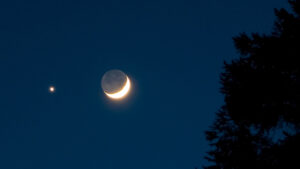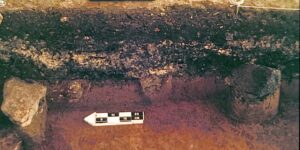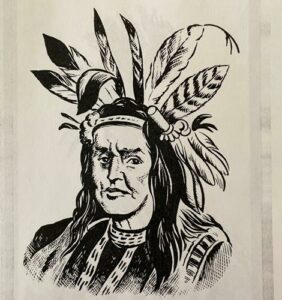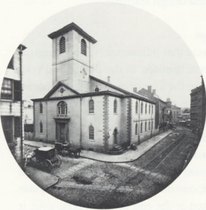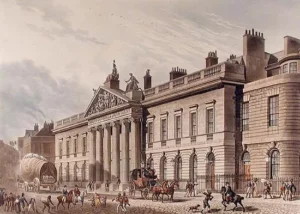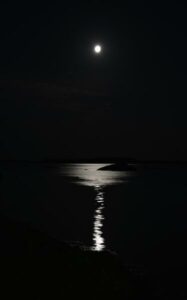Americanism Redux
July 27, your today, on the journey to the American Founding, 250 years ago, in 1773
The antlers of bucks are just now coming in. They’ve shed the old to make way for the new. The moon of the month, now in its last phase, is named for the males among the deer.
(A fading quarter-light)
What a Buck Moon it’s been for Janet Livingston.
Twenty-nine years old, she’s fallen in love with Richard. It’s a special love, too, with a mental as well as physical bond between them. Janet has dreams of Richard, but the dreams can be strangely specific about the future. Today, 250 years ago, it’s Day Two as wife and husband—Janet and Richard Montgomery—and real life has begun. They’re packing to move out of Richard’s farmhouse on sixty acres of land. They’ll move into a small cottage owned by her grandfather in the town of Rhinebeck, New York. Janet knows her new Irish husband is eager to buy nearby land and start not a farm but a farming enterprise. Janet also knows Richard has a burning anger and resentment running inside him. She’ll have to help manage his rage. He’s a former British officer with seven years of military service. His career hit a stonewall at the rank of captain; he failed to move up from there. He’s still bitter about it. That’s why, a few months ago, he resigned from the British Army, left England, and launched a new life here, a life based on loving his wife and hating the British, all under a vanishing Buck Moon.
(Janet Livingston Montgomery)
The last slice of the Buck Moon shines a dim light down on a place where the deer and the buffalo and, earlier, the mastodon roam. A shallow ocean used to cover the greater Ohio valley and a region later called Cain-tuck-ee by Native tribes, likely a name that started with the Mound-builders and passing down to the Shawnee, Delaware, Miami, and Munsee tribes of today, 250 years ago. The Ohio River stayed behind, along with remaining salt deposits inside four vibrant “Licks”—spots where the hooved animals come to lick the remaining salt-laced mineral springs. Generations of these animals have trekked here south of the Ohio River, grinding the grass to dust and pounding down a broad natural road as wide as two wagons lashed together side-by-side. People notice.
(modern dig site at Drennon Springs)
Among the noticers are five McAfee brothers from the British colony of Virginia who are here today, surveying invisible lines through glass scopes perched atop wooden tripods. They’re laying dimensions for new farms and a town near the salt licks. The McAfees have expelled two men from their party who attempted to prevent the brothers from discovering the four licks, dubbed Drennon Springs today, 250 years ago. Two Native leaders learn about the McAfees’ surveying party and ponder their next reactions: Hokoleskwa, meaning Cornstalk in English, is from the Shawnee and advocates war if necessary; while Papunhank, of the Munsees and now known as Johannes after converting to Moravian Christianity, has devoted his later adult life to pacifism and teaching how to overcome addiction to alcohol, wants to adopt nonviolence and peaceful co-existence. As the McAfees conclude their surveying, they spend time hunting deer near the Licks under the moon called Buck.
(rendition of Hokoleskwa) (Schoenbrunn, where Papunhank lived)
An antler-shaped curve of the moon is all that is visible by late July, the tilted Earth casting its shadow across Buck. On this day, 250 years ago, a new brick building, the Brattle Street Church in Boston, Massachusetts colony, is dedicated. A striking structure in the faint light, the church congregation features a wealthy and well-known list of members. They have more than Brattle Street Church membership in common—many of them are die-hard supporters of the colonial rights movement. John and Abigail Adams, Samuel Adams, John Hancock, and Joseph Warren list among the movement’s believers and church’s congregants. Firebrand Samuel Cooper is minister here and he’s fiercely proud of the new church building in Brattle Square.
(Cooper’s new church)
One of Cooper’s earliest and most widely embraced sermons was eighteen years ago in 1755 when British General Edward Braddock and scores of other British Redcoats died in battle against the French in the French and Indian War. Then, whipping up British colonial enthusiasm for fighting the French, he’d used words like “liberty”, “constitution”, “civil and religious rights”, “defend our rights and possessions”, and more. Looking back on the speech from the perspective of 1773, Cooper had been rehearsing for the next drama two decades hence, these current tensions with England and imperial authority. Now, 250 years ago today, swapping out nouns and keeping the verbs, Cooper scalds British imperial officials like Governor Thomas Hutchinson and Lieutenant Governor Andrew Oliver in blistering Sabbath sermons and weekday conversations. He has traveled from defending the empire he knows to defining a colonial autonomy emergent in the empire he now disdains. Cooper is increasingly known—whether in admiration by supporters or condemnation by opponents—as a leader of the colonial rights cause.
Above the Montgomerys, the McAfee brothers, the Native Shawnee and Munsi, and the Cooper-led attendees of the new Brattle Street Church, the Buck Moon disappears behind the clouds of the eastern half of North America. 250 years ago today.
Also
In London, colonial lobbyist, media wizard, and trans-Atlantic inventor-scientist celebrity Benjamin Franklin writes two letters to recipients back in Boston. One is Brattle Street Church pastor Samuel Cooper and the other is Speaker of the Massachusetts Assembly Thomas Cushing. They had written to Franklin five weeks ago with what was then the freshest news about Hutchinson’s and Oliver’s leaked letters, the public uproar over them in Boston, and subsequent demands for impeachment and removal. Franklin writes his replies to the men today. His two letters are strikingly similar in wording and layout—he hopes his role in the leak will be kept secret, doesn’t expect such secrecy to last much longer, cheers the public hatred of Hutchinson and Oliver, and touches on the possibility that Hutchinson’s predecessor—who had “engaged” Franklin as colonial agent—would blame Franklin for his actions. Assuming the same length of time will be required for Franklin’s replies to reach Boston, the entire exchange of one set of letters (those first sent east to England and replies subsequently sent west back to America) across the Atlantic Ocean will consume ten weeks or approximately twenty percent of a year’s time.
(Benjamin Franklin)
The oceanic back-and-forth also carries on for the Committee of Warehouses within the British East India Company. The Company’s committee receives requests for designation as tea consignees—those selected merchants who seeking to sell approved EIC tea in the British colonies as a result of Parliament’s Tea Act, enacted back in early May. Committee members, today 250 years ago, haggle over payment procedures, approving consignees here, denying them there. It’s the standard sort of jockeying for jobs, positions, and favors that goes along with any new major legislation, reform, or bureaucratic decision.
(EIC world headquarters)
For You Now
What does the light of the Buck Moon reveal?
Without doubt, it reveals nothing on its own. Another source of light has to shine for the moon to serve as any indirect source of seeing. Such a light is dependent, an ironic point in a series devoted to recognition of the independent.
Even at the full, moonlight illuminates a sight more partial than complete. It casts a line around the edge and hints with a gleam and glance. You’ll see a suggestion with details to be imagined rather than a total display of unforgiving illumination. A vanishing moon shows still less and leans still longer on your mind’s additions, involving a greater reliance on assumptions and a larger opening for predispositions.
Slipping through the shadows are pulses and impulses of the new 250 years ago. Lands surveyed and staked out which, to some, tell of a newly oncoming struggle. A marital couple making an old home into their new house. A new house of worship opened. New opportunities attach to a new law. And a new collective circumstance takes hold to make an individual risk worthwhile. The Buck throws a quarter-light on all the news. You provide the rest or, if not, content yourself with seeing in the dark.
This phase of the Buck Moon is incapable of showing the space between separate objects. To have any chance at being seen demands the presence of a surface that catches and reflects back the weak beams of the late moon. No surface, no sight. It’s not really any different than the truth of travel for time over space. Ocean, mountain ranges, land cut up by rivers and ravines, these physical elements build up the time needed to traverse them. As the time accumulates, unknowns become knowns, for unhappenings become happenings. They proliferate, as occurrences and actions mount up before the external arrives. By the time space has been crossed and outside enters in, the new becomes old and old is reborn. The unlit portion between different sights revealed by the Buck Moon has a similar state.
The Buck Moon, like every other moon of the month, is the mysterious backdrop for individual people and their actions. Janet’s husband Richard hates the British but he’ll have to act on that hatred, or not, in a particular situation. EIC’s consignees happily seek what they think is the rewarding path ahead, confident that a path always stands still. The ancient sea-bed dried to land draws, with magnet-like force, the Virginians and Natives to itself and, thereby, closer to each other and nearer to moments of deciding fates for themselves and others. A pastor follows a quest for his followers to live out their best lives, while his friend Franklin, a bespeckled visionary of wispy faith, waits for bones to wash up from the men his leaked letters may destroy.
The connections between them hide in darkness made by the Buck Moon. If they are to be seen, a different month’s moon will have to reveal it. So, too, is it for you. Out there, right now, lives are being lived that bear heavily on you. You don’t see them or know them. To you they don’t exist. A different moon, maybe the next month, or in the next year, will show something else to be true. When clarity comes, when revealing appears, when shock knocks on the door, your life will gain a new meaning. In the light of a new moon.
Suggestion
Consider this: how will I act in seeing something for the first time? And will my sense of first-sight blind me to the fact of its existence before?
